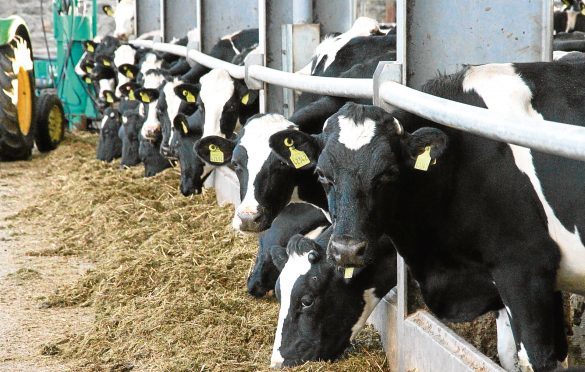Farmers union NFU Scotland (NFUS) has called on milk processors to go easy on dairy farmers who are struggling to meet production estimates due to the recent spell of extremely wet weather.
The union is urging milk buyers to adopt a “commonsense approach” to milk price penalties and to take into account exceptional weather.
Figures from the Met Office reveal that June rainfull in the west of Scotland was at its highest level since 1910 and heavy showers have continued to affect dairy farmers across the whole of Scotland since then.
This has resulted in reduced milk production on many farms, higher feeding costs, and the prospect of penalties from milk buyers as a result of the farms not hitting projected target production figures.
NFUS milk policy manager George Jamieson said the union had contacted the main milk purchasers in Scotland urging them to take exceptional circumstances, such as the weather, into consideration before “hammering producers” with price reductions.
“For the avoidance of any doubt, NFU Scotland totally supports the need for farmers to work with their milk buyer and supply predicted production figures,” said Mr Jamieson.
“However, we also believe that these predictive figures can only be calculated on factors that can be accurately predicted.As we know all too well in Scotland, one factor which cannot be predicted is the weather.
“We believe producers and processors should work on effective predictions, but with the ability to amend on an ongoing basis when exceptional circumstances, like record June rainfall, crop up.”
He said concerned farmers had told the union they were being forced to bring cows inside to avoid damaging wet pastures, and in some instances they were being forced to feed increased concentrates to cattle to help stall production losses.
“All this costs money and we believe it is harsh and insensitive to add price penalties to the burden,” said Mr Jamieson.
“The milk buyers we have contacted have been open to our calls, and appear understanding of the situation.
“Their advice is if farmers are concerned about meeting production predictions, then they should contact them and explain their position.”
He said the main milk buyer in the north and north-east – Muller – had told the union it was being proactive in developing better predictive tools to benefit both it and farmers.
This, said Mr Jamieson, was welcomed.
“We remain adamant that where poor, unseasonal weather has impacted on production, then there should be no penalties applied by any processor,” added Mr Jamieson.
